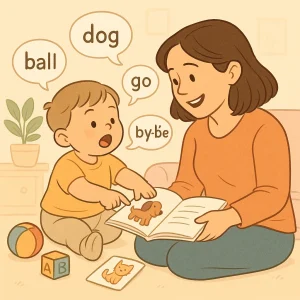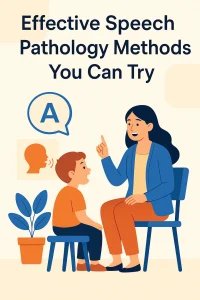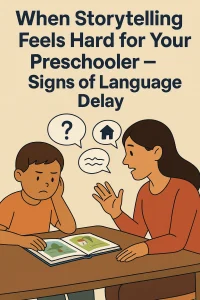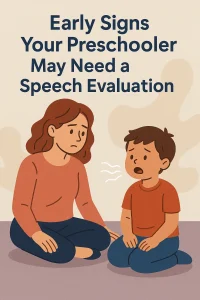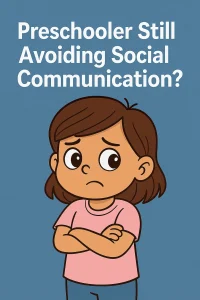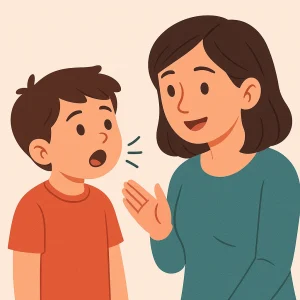Speech Therapy at Home: Simple Tips Every Parent Can Use
Last Updated: May 27, 2024
Imagine this: your child is struggling to express their thoughts, and you’re left wondering how to help them communicate more easily. As a parent, it can feel overwhelming trying to navigate the world of speech therapy. But you’re not alone! Many parents face similar challenges, and the good news is that with the right guidance, you can play a key role in supporting your child’s communication journey.
Speech therapy isn’t just about attending sessions with a therapist; it’s a team effort, where parents, caregivers, and professionals work together to unlock your child’s potential. In this guide, we’ll break down everything you need to know—from the basics of speech and language development to recognizing early signs of speech difficulties and what to expect from therapy. Let’s explore how you can empower your child to communicate confidently and thrive.
Understanding Speech and Language Development
As a parent, understanding how your child’s speech and language development can help you feel more confident about their progress. Knowing what to expect at each stage can also help you spot any potential delays and get extra support if needed. Let’s break down the key stages of your child’s speech and language development, from those adorable first sounds to their school-age conversations.
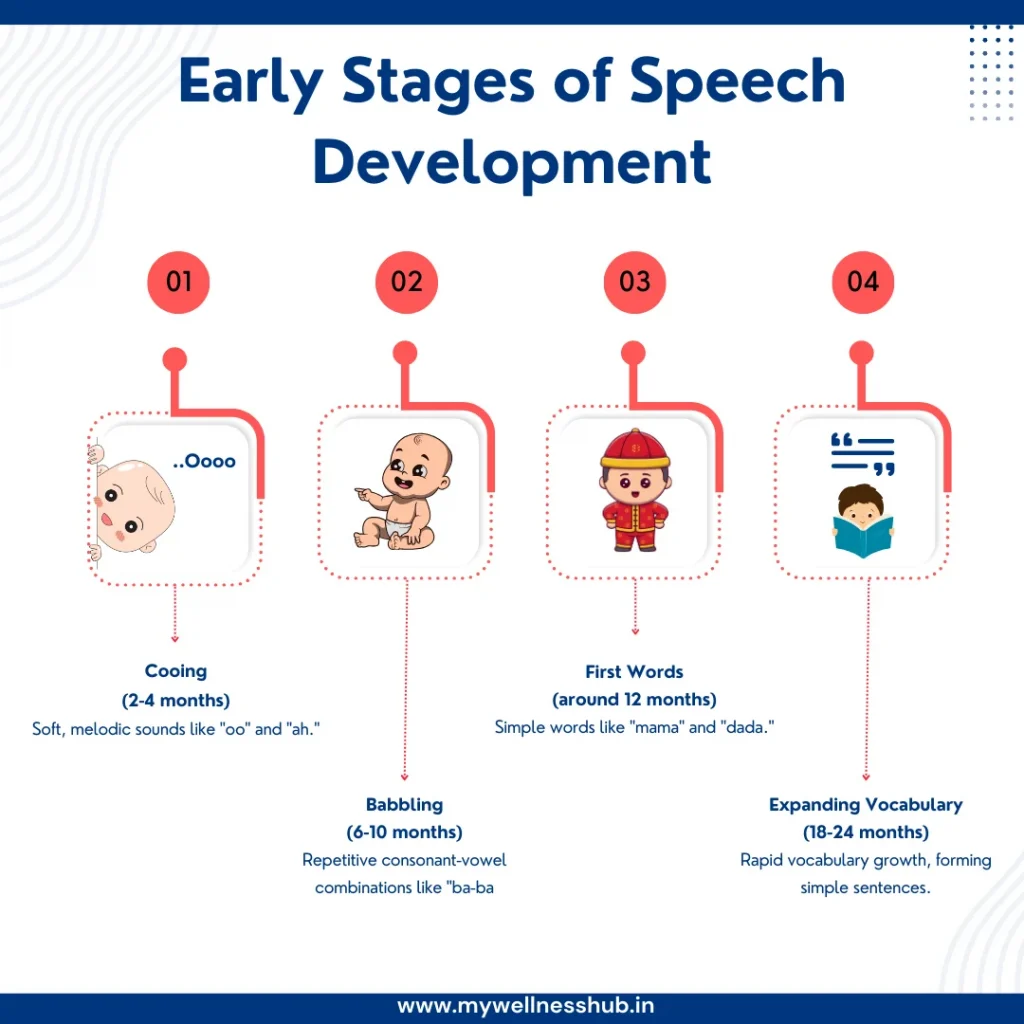
Early Stages of Development
Cooing (2-4 months)
At around 2 to 4 months, your baby may start to make cooing sounds like “oo” and “ah.” These are soft sounds that signal the beginning of their vocal journey. It may sound simple, but this early stage is important. Babies are experimenting with their voice, and this practice helps strengthen the muscles they’ll use for speaking later on. When your baby coos, respond with a smile or talk back—it helps them feel connected and encourages more sounds!
Also read: Speech Development Milestones: Your Child’s Talking Journey
Babbling (6-10 months)
As your baby reaches 6 to 10 months, babbling begins. You’ll hear them repeating sounds like “ba-ba” or “da-da.” This stage is exciting because it shows your child is learning to use their mouth and tongue to form different sounds. It’s not just cute babbling—it’s actually practice for talking! You can help by responding to their babbles as if you’re having a conversation, showing them that communication is a two-way street.
First Words (around 12 months)
Around your baby’s first birthday, they might start saying their first words. Common first words include “mama,” “dada,” or names of things they love, like “ball” or “milk.” It’s an exciting milestone because they’re now using words to communicate! When your child says their first word, repeat it back to them with lots of enthusiasm. This encourages them to keep trying new words.
Expanding Vocabulary (18-24 months)
Between 18 and 24 months, you’ll notice your child’s vocabulary growing quickly. Suddenly, they’re using two-word phrases like “more juice” or “big truck.” This is the stage where they’re absorbing words like a sponge. You can help by talking to them often, naming everyday objects, and asking simple questions. For example, while at the park, you could say, “Look at the big tree!” or ask, “Do you want to swing?” These interactions help build their vocabulary.
Speech Development Milestones and Parent Tips
| Stage of Development | Key Milestones | How Parents Can Help |
| Cooing (2-4 months) | Baby makes sounds like “oo” and “ah” | Respond to cooing with a smile or talk back to encourage more sounds. |
| Babbling (6-10 months) | Repeating sounds like “ba-ba” or “da-da” | Engage in “conversations” by responding to babbling as if you’re having a dialogue. |
| First Words (around 12 months) | Saying simple words like “mama,” “dada,” or “ball” | Repeat their words with enthusiasm and encourage more speaking. |
| Expanding Vocabulary (18-24 months) | Combining two-word phrases like “more juice” or “big truck” | Name objects and ask simple questions to help them build vocabulary. |
| Preschool (3-5 years) | Using longer sentences and following instructions | Ask open-ended questions and encourage conversations to develop language skills. |
| School-age (6-11 years) | Improved grammar, vocabulary, and ability to explain ideas | Encourage storytelling and ask them to describe their day or share a story. |
| Signs of Speech Disorders | Limited vocabulary, trouble being understood, or difficulty following instructions | Seek advice from a speech therapist if you notice these signs. |
| Early Intervention Benefits | Improved communication, academic success, and social skills | Start speech therapy early to help your child develop language and communication skills. |
Preschool to School Age Development
Preschool (3-5 years): Complex Sentences, Following Instructions, Conversations
By the time your child reaches preschool age, their language skills take a big leap. They’ll start using longer sentences, like “I want to go to the park” or “Can I have some juice, please?” They’ll also get better at following multi-step instructions like “Put your shoes on and grab your backpack.” At this stage, your child will begin having more meaningful conversations with you. Encourage this by asking open-ended questions, like “What did you play with today?” or “Why do you think the sky is blue?”
School-age (6-11 years): Vocabulary, Grammar, Academic and Social Skills
During the school years, your child’s language continues to grow. They’ll learn new words every day, and their grammar will improve, making their sentences clearer. You’ll notice they can explain things in more detail, like telling you about their day or describing their favorite story. Socially, they’ll also start using their language to solve problems and make friends. Encourage their storytelling by asking them to explain what happened at school or to share something fun they did with friends.
Know more: Speech and Language Milestones – 6 to 7 years
Recognizing Speech and Language Disorders
As a parent, being aware of the signs and symptoms of speech and language disorders in your child is important. Early detection can make a big difference in helping your child overcome challenges. Let’s explore some common speech and language disorders and the signs to watch for, so you know when it might be time to seek extra support.
Common Disorders
Expressive Language Disorder
Children with expressive language disorder have trouble expressing their thoughts and ideas. They might struggle to find the right words, use shorter sentences than other kids their age, or have a limited vocabulary. For example, while other children may say, “I want to go outside and play,” a child with expressive language disorder might only say, “Play outside.” If you notice your child having difficulty putting their thoughts into words or speaking in a way that seems too simple for their age, this could be a sign of an expressive language disorder.
Receptive Language Disorder
Receptive language disorder means that a child has trouble understanding what others are saying. Your child might struggle with following directions, answering questions, or understanding stories. For example, when you say, “Go get your shoes and put on your jacket,” they might only grab one item or seem confused by the instructions. It may sometimes seem like they’re not paying attention when, in fact, they’re having trouble processing the language.
Articulation Disorders
Children with articulation disorders have difficulty pronouncing certain sounds correctly. For example, they might say “wabbit” instead of “rabbit” or “nake” instead of “snake.” While it’s normal for young children to make some sound errors, if your child continues to struggle with specific sounds as they grow, it could indicate an articulation disorder. Articulation issues can make it hard for others to understand what your child is saying.
Stuttering
Stuttering is a speech disorder that affects the flow of speech. A child who stutters may repeat sounds or syllables (like “b-b-ball”), prolong sounds (such as “ssssnake”), or have moments where they can’t get the words out at all. This can be frustrating for children and may cause them to feel anxious about speaking. If your child frequently struggles with starting or continuing speech, stuttering could be the issue.
Read More: What is Stuttering: Types, Symptoms, and Causes
Pragmatic Language Disorder
Pragmatic language disorder, also called social communication disorder, affects how a child uses language in social situations. Children with this disorder may have trouble taking turns during conversations, staying on topic, or using appropriate body language. They might also misunderstand jokes, sarcasm, or expressions like “it’s raining cats and dogs.” For example, if your child doesn’t seem to pick up on social cues or struggles to engage in back-and-forth conversations, it could point to a pragmatic language disorder.
Voice Disorders
Voice disorders occur when a child’s voice sounds unusual, such as being hoarse, too quiet, too loud, or nasal. For instance, if your child’s voice sounds raspy for no obvious reason or they frequently lose their voice, they may have a voice disorder. Sometimes, these issues can come from yelling too much, but they can also be related to medical conditions affecting the vocal cords.
Signs to Watch For
Recognizing the early signs of speech and language disorders is crucial for timely intervention. Here are some signs to watch for at different stages:
- Limited Babbling by 12 Months
If your child isn’t making sounds or babbling by 12 months, it could be an early sign of a speech or language delay. Babbling is a key milestone, so if it’s missing, it’s worth checking with a specialist. - Difficulty Being Understood by Family Members
By the time your child is two years old, family members should understand most of what they say. If close family members often have trouble understanding your child, this might indicate an articulation or expressive language disorder. - Trouble Following Instructions or Understanding Stories
If your child seems to struggle with simple instructions like “put your toys away” or doesn’t follow along when you’re reading them a story, it could signal a receptive language disorder. You might notice they don’t respond correctly to questions or look confused when given simple tasks.
Read more: Best Speech Therapy Tips For Parents to Use at Home
The Importance of Early Intervention
Early intervention in speech and language therapy is crucial for your child’s development. The sooner speech and language issues are addressed, the better chance your child has to improve their communication skills. Let’s look at the key reasons why early intervention is so important for your child’s growth.
Optimal Development
Early intervention helps your child develop proper communication skills right from the start. By starting therapy early, children can learn how to form sounds, say words correctly, and build a strong vocabulary. This early help makes it easier for them to communicate as they grow. For example, with early support, a child might learn how to say difficult sounds more clearly, helping them be understood by family and friends.
Academic Success
Strong language skills are important for doing well in school. Children who can speak clearly and understand language are better able to follow instructions, ask questions, and join in classroom activities. Early speech therapy can give your child a head start in school, making it easier for them to learn, participate, and express their ideas.
Social Skills
Communication is key to forming friendships and social connections. Early speech therapy helps children learn how to have conversations, understand social cues like body language, and take turns in discussions. These skills help your child feel more comfortable interacting with others and making friends.
Reduced Need for Intensive Therapy
When children get help early, they often need less therapy later on. Early intervention can prevent small speech issues from becoming bigger problems. By addressing the challenges early, your child may need less long-term support as they continue to grow.
In short, early intervention helps your child build the communication skills they need for school, social interactions, and everyday life. Starting therapy early makes it easier for your child to succeed and feel confident.
Working with a Speech Therapist
Working with a speech therapist is an important step in helping your child develop their speech and language skills. Knowing what to expect during these sessions can help you and your child feel more comfortable and engaged. Here’s a simple breakdown of what typically happens in speech therapy sessions.
What to Expect
Warm-Up Activities
Each session usually begins with warm-up activities that help your child feel comfortable and get ready for focused work. These activities might include fun games, songs, or simple interactive exercises designed to engage your child. For example, a therapist might play a matching game with your child or sing a song to grab their attention.
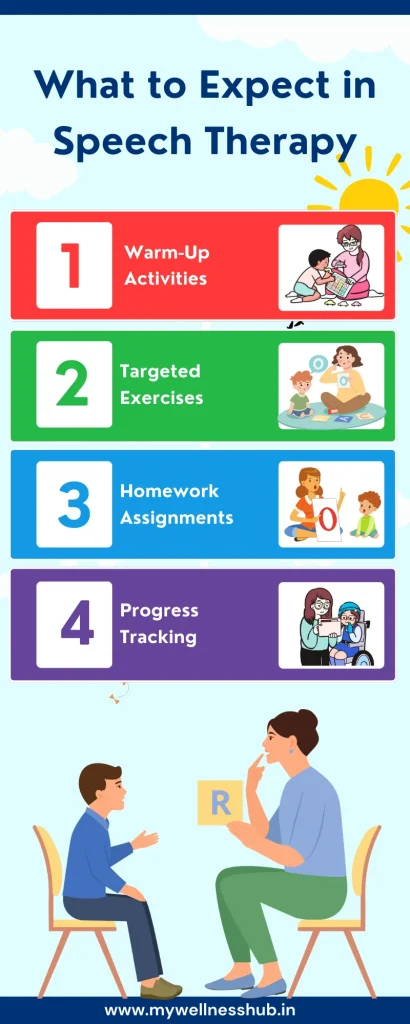
These activities are more than just fun—they help build a positive connection between your child and the therapist, making your child feel more at ease. This warm-up phase helps set the tone for a productive session where your child is more likely to participate.
Targeted Exercises
After the warm-up, the therapist will move into targeted exercises that focus on your child’s specific speech or language needs. These exercises are tailored to address the areas where your child needs the most support, such as pronunciation, vocabulary building, or improving social communication.
For instance, if your child has trouble pronouncing certain sounds, the therapist may use pictures and repetition to help them practice those sounds. If your child struggles with expressing themselves, the therapist might engage them in storytelling or role-playing activities to build their language skills.
Homework Assignments
To keep the progress going between sessions, the therapist will likely assign homework for your child to practice. These activities are important because they reinforce what was learned during therapy. Homework might include practicing certain sounds, reading together, or playing language-based games at home.
As a parent, your involvement is key here. Helping your child complete their speech therapy homework can speed up their progress. Try to make these activities part of your regular routine, such as practicing sounds during playtime or reviewing vocabulary words at bedtime.
Progress Tracking
Throughout the therapy process, the therapist will regularly assess your child’s progress. Progress tracking helps the therapist see what’s working and what might need more focus. The therapist will use different methods, like observing your child, asking for feedback from you, or using simple tests to measure improvement.
You’ll be updated regularly on how your child is doing, and the therapist will adjust the plan as needed to keep them on track. For example, if your child is making great progress with pronunciation, the therapist may shift focus to building vocabulary or social skills.
Tips for Parents
Supporting your child’s speech and language development is an important and rewarding journey. As a parent, your role is key to their progress. Here are some practical tips to help you support your child effectively during speech therapy.
Supporting Your Child
- Be Patient
Speech therapy progress can take time, and it’s normal for improvements to happen gradually. The key is to be patient and celebrate the small steps your child takes. For example, if your child finally pronounces a challenging sound correctly after weeks of practice, make sure to acknowledge and praise that achievement. Your patience and encouragement will make them feel proud and motivated to keep trying. - Practice at Home
What your child learns in therapy sessions needs to be reinforced at home. Regular practice is essential for progress. Follow the therapist’s suggestions for home activities and try to make them part of your everyday routine. For instance, if your child is working on certain sounds, you could play games like “I Spy” where they have to say those words. Reading together or having simple conversations can also help reinforce what they’re learning in therapy. - Communicate Openly
It’s important to stay in touch with your child’s speech therapist. Open communication allows you to share any observations or concerns you have about your child’s progress. For example, if you notice your child struggling with a certain sound at home, let the therapist know. This way, the therapist can adjust their approach if needed and provide you with additional guidance on how to help at home. - Create a Supportive Environment
Make sure your home is a supportive environment for your child’s speech and language development. Encourage your child to speak without fear of making mistakes. Offer praise when they try, even if they don’t get it right. For example, if your child struggles to say a new word, respond with a smile and say, “Great try! Let’s practice it together.” A positive environment helps build their confidence. - Be a Role Model
Children often learn by watching their parents. Be a good role model by using clear speech, proper grammar, and engaging your child in conversations. For instance, when you’re cooking, you might narrate what you’re doing: “I’m chopping the carrots now—can you say ‘chop’?” This kind of modeling helps your child learn how to communicate more effectively.
Conclusion
In conclusion, navigating speech therapy as a parent can feel overwhelming, but with the right tools and guidance, you play a vital role in your child’s communication journey. From understanding speech development to working closely with a therapist, you can help your child overcome challenges and thrive. Early intervention, practicing at home, and creating a supportive environment are key steps to success.
Frequently Asked Questions:
1. What is the importance of early intervention in speech therapy?
Early intervention in speech therapy is crucial because it helps address speech and language issues before they become ingrained. It can lead to better developmental outcomes, improved academic success, enhanced social skills, and a reduced need for intensive therapy later on. Early therapy also allows for timely support, ensuring your child can communicate effectively as they grow.
2. How can I tell if my child has a speech or language disorder?
Signs of speech or language disorders include limited babbling by 12 months, difficulty being understood by family members, trouble following instructions, and not using simple sentences by age two. If you notice any of these signs, it’s essential to seek professional advice for an accurate diagnosis and appropriate intervention.
3. What should I expect during a speech therapy session?
During a speech therapy session, you can expect warm-up activities to engage your child, targeted exercises to address specific speech and language challenges, homework assignments to reinforce learning at home, and progress tracking to monitor your child’s development. Each session is tailored to your child’s unique needs.
4. How can I support my child’s speech therapy at home?
You can support your child’s speech therapy at home by being patient, practicing recommended exercises, communicating openly with their therapist, creating a supportive environment, and being a good role model. Consistent practice and positive reinforcement can significantly boost your child’s progress.
5. Are there any resources available for parents of children in speech therapy?
Yes, there are numerous resources available for parents, including books, websites, support groups, educational apps, and parent training sessions. At Wellness Hub, we offer comprehensive resources and support to help you assist your child’s speech and language development effectively.
6. How long does my child need to stay in speech therapy?
The duration of speech therapy varies depending on your child’s specific needs and progress. Some children may need only a few months of therapy, while others with more complex issues may require longer-term support. Regular assessments by the therapist will help determine the appropriate length of treatment.
7. Can speech therapy help with academic success?
Yes, speech therapy can significantly improve academic success by enhancing your child’s ability to understand and follow instructions, participate in classroom discussions, and engage with reading and writing activities. Effective communication skills are essential for academic achievement and overall school performance.
8. What is the role of a speech therapist?
A speech therapist assesses, diagnoses, and treats speech and language disorders. They create personalized treatment plans, conduct therapy sessions, provide targeted exercises, and track progress. Speech therapists also work closely with parents to offer guidance and support throughout the therapy process.
9. How do I choose the right speech therapy program for my child?
When choosing a speech therapy program, consider the therapist’s qualifications, experience, and approach to treatment. Look for programs that offer personalized treatment plans, regular progress tracking, and parent involvement. Wellness Hub provides a range of speech therapy services tailored to meet your child’s unique needs.
10. What are the benefits of parent involvement in speech therapy?
Parent involvement in speech therapy leads to better outcomes for children. By practicing at home, providing encouragement, and maintaining open communication with the therapist, parents can significantly enhance their child’s progress. Active participation also helps children feel supported and motivated.
About the Author:
Anuradha Karanam
Speech-language pathologist (7+ years of experience)
Anuradha Karanam is a skilled speech-language pathologist with over 6 years of experience. Fluent in Tamil, Telugu, Hindi, and English, she specializes in parent counseling, speech sound disorders, fluency assessment, and speech-language evaluations. Anuradha excels at working with children with developmental disorders, offering creative and effective therapy programs. Currently, at Wellness Hub, she holds a BASLP degree and is registered with the RCI (CRR No A85500). Her patience, ambition, and dedication make her a trusted expert.
Book your Free Consultation Today
Parent/Caregiver Info:
Client’s Details:
* Error Message


